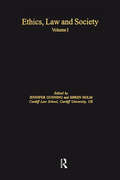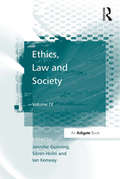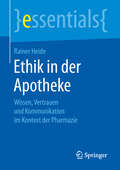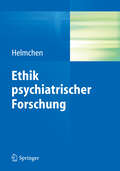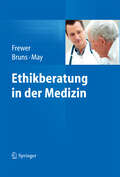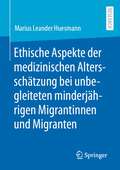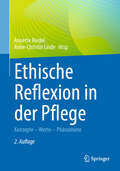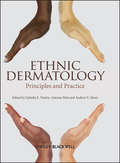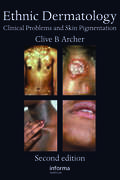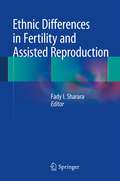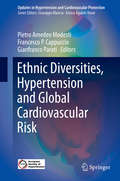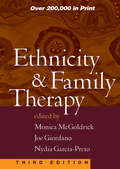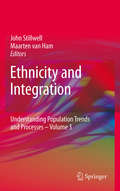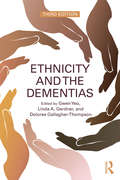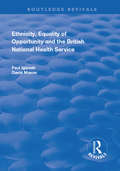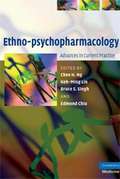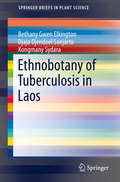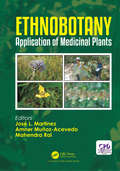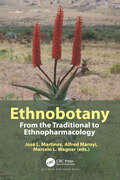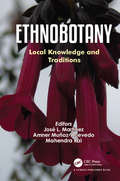- Table View
- List View
Ethics, Law and Society: Volume I
by Søren HolmThis key collection brings together a selection of papers commissioned and published by the Cardiff Centre for Ethics, Law & Society. It incorporates contributions from a group of international experts along with a selection of short opinion pieces written in response to specific ethical issues. The collection addresses issues arising in biomedical and medical ethics ranging from assisted reproductive technologies to the role of clinical ethics committees. It examines broader societal issues with particular emphasis on sustainability and the environment and also focuses on issues of human rights in current global contexts. The contributors collect responses to issues arising from high profile cases such as the legitimacy of war in Iraq to physician-related suicide. The volume will provide a valuable resource for practitioners and academics with an interest in ethics across a range of disciplines.
Ethics, Law and Society: Volume IV
by Søren Holm Jennifer Gunning Ian KenwayThis key collection brings together a selection of papers commissioned and published by the Cardiff Centre for Ethics, Law & Society. It incorporates contributions from a group of international experts along with a selection of short opinion pieces written in response to specific ethical issues. The collection addresses issues arising in biomedical and medical ethics ranging from assisted reproductive technologies to the role of clinical ethics committees. It examines broader societal issues with particular emphasis on sustainability and the environment and also focuses on issues of human rights in current global contexts. The contributors collect responses to issues arising from high profile cases such as the legitimacy of war in Iraq to physician-related suicide. The volume will provide a valuable resource for practitioners and academics with an interest in ethics across a range of disciplines.
Ethics, Medicine, and Information Technology
by Kenneth W. GoodmanInformation technology is transforming the practices of medicine, nursing, and biomedical research. Computers can now render diagnoses and prognoses more accurately than humans. The concepts of privacy and confidentiality are evolving as data moves from paper to silicon to clouds. Big data promises financial wealth, as well as riches of information and benefits to science and public health. Online access and mobile apps provide patients with an unprecedented connection to their health and health records. This transformation is as unsettling as it is exhilarating. This unique new book is essential for anyone who uses computers in health care, biomedical research or public health, and cares about the ethical issues that arise in their work. With chapters spanning issues from professionalism and quality to mobile health and bioinformatics, it establishes what will become the 'core curriculum' in ethics and health informatics, a growing field which encourages truly inter- and multidisciplinary inquiry.
Ethiek voor artsen arbeid en gezondheid: Praktijkboek beroepsethiek en morele oordeelsvorming
by André Weel Ruud Meij Kevin De DeckerDit praktijkboek maakt de bedrijfs- en verzekeringsartsen wegwijs in de beroepsethiek van hun eigen vak. Hoe komen zij tot een moreel juist oordeel? Op welke sociomedische morele beginselen steunt een ethiek voor artsen voor arbeid en gezondheid? Bovenal: hoe te komen tot een moreel juist oordeel in lastige praktijkvragen waar wet, wetenschap en geweten met elkaar in de clinch liggen? Voor dergelijke vragen is een gefundeerde methode beschikbaar: Morele Oordeelsvorming. Het boek is een grondige kennismaking met deze methode. Het geeft antwoord op de vraag ‘Wanneer is een handeling moreel juist?’ en ‘Hoe met collega’s tot een moreel juiste beslissing te komen?’ Zestien knellende praktijksituaties, waar rechten, belangen en wensen van cliënten, werkgevers en anderen met elkaar botsen, illustreren de methode Morele Oordeelsvorming in de praktijk. Met een blik op de morele geschiedenis van de sociale geneeskunde, een overzicht van sociomedische beginselen en verdiepende reflectievragen, is het boek waardevol en bruikbaar voor de beroepsopleiding en de nascholing. Het is vooral nuttig voor intercollegiale toetsingsgroepen. Het is een uitstekende basis voor de verdere ontwikkeling van een beroepsethiek, waardoor artsen voor arbeid en gezondheid ook in de toekomst hoeder kunnen zijn van sociale rechtvaardigheid op het gebied van participatie en gezondheid. Dr. André Weel, vele jaren werkzaam geweest als bedrijfsarts, onderzoeker en opleider, was eerder auteur van Praktijkdilemma’s voor bedrijfs- en verzekeringsartsen (2005), een voorloper van dit boek. Kevin De Decker, verzekeringsarts, is werkzaam als landelijk adviseur verzekeringsartsen bij UWV, en voorzitter van de NVVG. Ruud Meij, filosoof, was tot zijn pensioen werkzaam aan de Universiteit voor Humanistiek en is partner in Governance & Integrity en directeur van de Foundation for Justice, Integrity and Anti Corruption.
Ethik im Gesundheitswesen (Springer Reference Pflege – Therapie – Gesundheit)
by Annette Riedel Sonja LehmeyerDieses Werk richtet sich an Pflegefachpersonen, Studierende, Lehrende, Ethikberaterinnen und Ethikberater im Gesundheitswesen. Es bietet umfangreiches und fundiertes Wissen zu den ethischen Themen und Diskursen im Pflege- und Gesundheitswesen. Besondere ethische Herausforderungen, zentrale Grundlagen und Rahmenbedingungen einer (inter-)professionellen ethischen Praxis bilden den Ausgangspunkt der Diskussion und Reflexion ethischer Fragestellungen und Konfliktfelder. Es werden hilfreiche Instrumente, Verfahren und Methoden analysiert und Möglichkeiten der methodischen Unterstützung ethischer Reflexion und Entscheidungsfindung aus unterschiedlichen Perspektiven dargestellt. Ergänzend werden Aspekte der Ethikbildung in den Gesundheitsfachberufen und im Praxisalltag beleuchtet und von den erfahrenen Autorinnen und Autoren eingeordnet.
Ethik in der Apotheke: Wissen, Vertrauen und Kommunikation im Kontext der Pharmazie (essentials)
by Rainer HeideDieses Buch ist ein Plädoyer dafür, dass Pharmazeuten sich mit der moralischen Bewertung ihres Handelns beschäftigen sollten. Der Pharmazeut wird als Kaufmann, selbst bei ethisch und moralisch gutem Handeln, immer anders agieren (müssen) als der Heilberufler, da bei Letzterem allein die selbstlose fachliche Hilfe als Primat des Handelns angenommen wird. Rainer Heide gibt in diesem essential Denkanstöße und Handlungsempfehlungen im interpersonellen Kontext der öffentlichen und Klinikapotheke. Der Autor: Dipl. Biol. Rainer Heide, Pharmazeut, Schwerpunkte seiner Arbeit sind geriatrische Pharmazie und Ethik in der Pharmazie. Rainer Heide lehrt als Honorardozent in der pflegerischen Ausbildung am Klinikum der Universität Jena und an verschiedenen Weiterbildungseinrichtungen. Er ist Mitglied in der Deutschen Gesellschaft für Geriatrie, dem Arbeitskreis „Reduktion freiheitsentziehender Maßnahmen in der Pflege“ der Stadt Jena und Vorstand des Jenaer Demenz Informations- und Beratungsverein JeDI e.V.
Ethik psychiatrischer Forschung
by Hanfried HelmchenErstmals für den deutschen Sprachraum werden hier die ethischen Implikationen der Forschung mit psychisch Kranken umfassend dargestellt. Diese Forschung zielt darauf, den faktisch, ethisch und rechtlich begründeten Bedarf an evidenzbasiertem Wissen zur Diagnostik und Behandlung psychisch Kranker zu decken. Forschung wird dabei als Intervention verstanden, die mit Patienten mittels wissenschaftlichen Methoden auf überindividuelles Wissen zielt und damit über den individuellen Nutzen für den teilnehmenden Patienten hinausgeht. Solche Forschungsintervention ist ethisch nur vertretbar, wenn erstens ihr Nutzen-Risiko-Verhältnis vernünftig und gerechtfertigt und zweitens die Einwilligung nach Aufklärung gültig ist. Dass diese Grundvoraussetzungen für jedes konkrete Forschungsprojekt eingehalten werden, wird gesellschaftlich über Ethikkommissionen kontrolliert. Denn Vertrauen der Öffentlichkeit in die ethische Vertretbarkeit der klinischen Forschung ist eine wesentliche Voraussetzung für die Bereitschaft von Menschen, an solcher Forschung teilzunehmen. Diese theoretischen Ausführungen werden im zweiten Teil des Buches durch konkrete Beispiele aus ausgewählten Forschungsgebieten veranschaulicht."
Ethik-Cafés im Sozial- und Gesundheitswesen: Sich über aktuelle Lebensfragen ethisch verständigen und austauschen
by Manfred Baumann Carola FrommSeit über zehn Jahren moderieren die Autor*innen mit hohem Zuspruch das Ethik-Café in Einrichtungen des Sozial- und Gesundheitswesens. Menschen aus unterschiedlichen Berufen, Patient*innen, An- und Zugehörige sowie ethisch Interessierte haben im Ethik-Café die Möglichkeit, aus ihrer persönlichen und beruflichen Perspektive ethische Fragestellungen zu diskutieren, die für ihren Alltag relevant sind. Ethik-Cafés sind niederschwellig, multiprofessionell, interdisziplinär. Die Teilnehmer*innen profitieren von dieser Perspektivenvielfalt. Das Buch stellt die Konzeption sowie deren Evaluation, die theoretischen und methodischen Voraussetzungen und in vielen Beispielen die praktische Umsetzung von Ethik-Cafés dar. Das entwickelte Vier-Phasen-Modell des ethischen Prozesses wird exemplarisch in 25 Ethik-Cafés zu Themen aus dem Sozial- und Gesundheitswesen angewendet und umgesetzt. Das Buch richtet sich an Mitarbeiter*innen und Führungskräfte im Sozial- und Gesundheitswesen, Lehrer*innen, Lernbegleiter*innen und Auszubildende in der generalistischen Pflegeausbildung, an Fort- und Weiterbildungsreferent*innen, Studierende, Ehrenamtliche sowie alle ethisch Interessierten.
Ethikberatung in der Medizin
by Florian Bruns Arnd T. May Andreas FrewerIn den letzten Jahren hat sich eine Vielfalt unterschiedlicher Gremien zur Ethikberatung entwickelt: vom Konsil mit einem einzelnen Berater bis zum Ethikkomitee. In dem Band werden die Ethikberatung, ihre Entwicklung und Anwendung, sowie die Gründung von Gremien in Krankenhäusern, Pflegeeinrichtungen, Hospizen und von niedergelassenen Ärzten anhand von Fallbeispielen erläutert. Dabei schlagen die Autoren eine Brücke zwischen traditioneller philosophischer Ethik und anwendungsbezogener klinischer Ethik. Auch rechtliche Fragen werden erörtert.
Ethische Aspekte der medizinischen Altersschätzung bei unbegleiteten minderjährigen Migrantinnen und Migranten
by Marius Leander HuesmannIst das Alter von unbegleiteten minderjährigen Migrantinnen und Migranten bei der Einreise nach Deutschland nicht sicher nachweisbar, kann eine medizinische Altersschätzung angeordnet werden. Diese Dissertation analysiert zum einen, ob die medizinische Altersschätzung geeignet ist, eine Minder- oder Volljährigkeit bei Personen nachzuweisen, die ein Alter von 16 oder 17 Jahren angeben, und zum anderen, wie diese Altersschätzung medizinethisch zu bewerten ist. Hierfür wurden die von der Arbeitsgemeinschaft für Forensische Altersdiagnostik der Deutschen Gesellschaft für Rechtsmedizin derzeit empfohlenen Methoden (körperliche Untersuchung, Röntgenuntersuchung der Hand, der Weisheitszähne, der Schlüsselbeine) auf ihre Aussagekraft hin untersucht. Die Ergebnisse wurden auf Basis der vier medizinethischen Prinzipien von Beauchamp und Childress (Wohltun, Nicht-Schaden, Gerechtigkeit und Respekt vor der Autonomie) diskutiert. Es zeigt sich, dass keine der genannten Untersuchungsmethoden geeignet ist, bei einem angegebenen Alter von 16 oder 17 Jahren sicher eine Minder- oder Volljährigkeit nachzuweisen oder auszuschließen. Zudem sind diese Untersuchungen aus medizinethischer Perspektive in vielerlei Hinsicht problematisch, sodass die medizinische Altersschätzung in der übergroßen Mehrheit der Fälle derzeit aus ethischen Gründen nicht zu rechtfertigen ist.
Ethische Reflexion in der Pflege: Konzepte – Werte – Phänomene
by Annette Riedel Anne-Christin LindePflegerisches Handeln begründen, reflektieren und professionell entscheiden! Dieses Buch richtet sich an Pflegende, Studierende von Pflege- und Gesundheitsstudiengängen und Weiterbildungsteilnehmende wie auch an Ethikberatende und Lehrende. Es setzt Reflexionsimpulse, bietet ethische Orientierung und Anhaltspunkte für ethisch gut begründete Entscheidungen im Praxisalltag. Pflegfachpersonen entscheiden oft situativ, denn viele Umstände erfordern schnelle Entschlüsse und vorausschauendes Handeln. Doch nach welchen Kriterien werden die vielfältigen ethischen Entscheidungen in der Pflegepraxis getroffen? Welche Werte oder Prinzipien leiten das Handeln und welche Strukturen unterstützen die ethische Analyse und Entscheidungsfindung? Die Autor*innen verdeutlichen ethische Aspekte von evidenzbasierten, fachlich fundierten Pflegehandlungen und die Notwendigkeit von systematischen Methoden für die ethische Entscheidungsfindung. Lernen Sie durch den Praxisbezug und Fallbeispiele und erlangen Sie mehr Sicherheit für die ethischen Herausforderungen in Ihrem Wirkungsbereich!
Ethnic Dermatology
by Andrew F. Alexis Ophelia E. Dadzie Antoine PetitRichly pigmented skin is the most common skin type internationally Historically, dermatology has focused on white skin. But rich pigmentation can lead to differences in presentation, disease course and outcome, and reaction to treatment. Some dermatologic conditions are seen predominantly or only in richly pigmented skin.Ethnic Dermatology: Principles and Practice provides a practical approach to the dermatology of non-white skin. Written from a global perspective to include Asian, African-Caribbean and North African skin types, it covers all the bases of dermatology including:Grading scales in dermatologic diseasePediatric dermatologyDermatology and systemic diseaseDrug eruptionsHair and scalp disordersCosmetic dermatologyWith a central focus on practical action from an international cast of authors, Ethnic Dermatology: Principles and Practice gives you the clinical tools you need when skin colour matters.
Ethnic Dermatology: Clinical Problems and Skin Pigmentation
by Clive B ArcherRecognizing the enormous variety of skin diseases in lightly pigmented skin depends on the development of a number of visual skills that have to be developed still further to recognize skin diseases in deeply pigmented skin from different ethnic groups. The comparison of skin disorders in white and deeply pigmented skin is in itself an important wa
Ethnic Differences in Fertility and Assisted Reproduction
by Fady I. ShararaOver the past 10 years, studies have shown that the rates of fertility vary in different ethnic groups. Ethnic differences also play a significant role in the outcome of assisted reproductive technology (ART) cycles. In the United States, minority groups--African Americans, Hispanics (mainly Mexicans and Central Americans), East Asians (Chinese, Japanese, Koreans, Philippinos) and South Asians (Indians, Pakistanis, and Bengalis)--have significantly lower chances of live births compared to Caucasian women. Birth outcome data collected by the Society for Assisted Reproductive Technology shows a worsening trend in conception rates between the years 1999-2000 and 2004-2006, raising more concern that the disparity in fertility rates between minority groups and white women is widening over time. This comprehensive book serves to answer the questions that arise when managing infertility in a multi-ethnic population. An expert assembly of key leaders in the field of reproductive medicine imparts insight and clinical experience in order to identify and analyze the possible causes of racial disparities in fertility outcome. Some of the reviewed causes include higher Body Mass Index (BMI), tubal diseases, metabolic syndrome, and fibroids in African Americans; tubal disease and higher early pregnancy loss in Hispanics; higher incidence of diminished ovarian reserve and lower BMI in East Asians; and higher incidence of polycystic ovarian disease (PCOS) in South Asians. The book also provides a review of data on access to care and ART services in developing countries. A thoughtful combination of evidence-based medicine and advanced treatment options, this book is sure to distinguish itself as the definitive reference on ethnic differences in assisted reproduction.
Ethnic Diversities, Hypertension and Global Cardiovascular Risk (Updates in Hypertension and Cardiovascular Protection)
by Gianfranco Parati Pietro Amedeo Modesti Francesco P. CappuccioIn the context of the most significant influx of migrants in European history, the objective of this book is to provide healthcare professionals with essential knowledge and skills to effectively treat and prevent cardiovascular diseases in ethnic minorities. Acknowledging that the scientific and cultural training of health professionals on the specific health needs of minority groups is still limited and likely biased, the book sheds light on the different health policies in European countries as well as epidemiologic data on cardiovascular events among migrants. In addition, it presents an in-depth analysis of potential ethnic-group-specific drivers of global cardiovascular risk within this new and challenging framework – as well as issues related to its prevention and treatment.The prevalence of hypertension, diabetes, chronic kidney disease, obesity, and metabolic syndrome is found to be higher among most minority groups than in the native population, yet their access to treatment and health services may be limited by cultural and language barriers. As health professionals are confronted with such intercultural challenges on a daily basis, specific training and dedicated publications are thus essential to accompany and foster a constructive development towards a pluralist and healthier society. This book addresses that need, offering a unique and revealing resource.
Ethnic Skin and Hair and Other Cultural Considerations (Updates in Clinical Dermatology)
by Howard I. Maibach Becky S. LiThis book is written to help educate dermatologists and general physicians of the challenges involved in treating those with darker skin tones in culturally appropriate ways. Distinctly broken up into three sections for ease of use, the reader enters the text through a series of chapters meant to introduce the physician to the anatomical structure and makeup of patient with skin of color as well as the evolution basic concepts for understanding and treatment. The second and longest section looks at diseases and cosmetic concerns covering some of the most common issues for patients with skin of color. The last section offers cultural considerations to treatment and care. Socially conscious and comprehensive, Ethnic Skin and Hair is written by some of the leading names in dermatological treatment of skin of color, and functions as a concise and thorough tool for dermatologists at every stage in their career.
Ethnicity and Family Therapy
by Monica McGoldrick, Joe Giordano and Nydia Garcia-PretoThis widely used clinical reference and text provides a wealth of knowledge on culturally sensitive practice with families and individuals from over 40 different ethnic groups. Each chapter demonstrates how ethnocultural factors may influence the assumptions of both clients and therapists, the issues people bring to the clinical context, and their resources for coping and problem solving.
Ethnicity and Integration
by John Stillwell Maarten Van HamThe theme of this volume is ethnicity and the implications for integration of our increasingly ethnically diversified population, with topics covering demographics and migration of ethnic groups, measures of integration or segregation, health and labour market characteristics, ethnicity and crime and ethnic population projections.
Ethnicity and the Dementias (Third Edition)
by Gwen Yeo Linda A. Gerdner Dolores Gallagher-Thompson<p>In recent years, the literature on the topic of ethnic and racial issues in Alzheimer’s disease and other dementias has increased dramatically. At the same time, the need for cultural competence in all of geriatric care, including dementia care, is increasingly being acknowledged. Dementia is a large societal problem affecting all communities, regardless of race or ethnicity, and understanding dementia for specific groups is tremendously important for both clinical knowledge and for health planning as a nation. <p>This third edition of Ethnicity and the Dementias offers invaluable background information in this area, while also examining how those suffering from dementia and their family members respond or adapt to the challenges that follow. Thoroughly updated and revised throughout, the book features contributions from leading clinicians and researchers in the field, with particular attention given to genetic and cultural factors related to dementia, effective prevention and treatment strategies, and issues in caregiving and family support. Chapters offer specific recommendations for dementia care in 11 ethnic/racial groups, as well as suggestions for working effectively with LGBTQ+ families. <p>Providing a truly comprehensive resource on ethnicity and dementia, and including reflections on emerging trends and the future of caregiving, this new edition is ideal reading for clinicians, educators, researchers, policy makers, and families, in search of the most current ethnogeriatric findings.</p>
Ethnicity, Equality of Opportunity and the British National Health Service
by David Mason Paul IganskiThis title was first published in 2002: Numerous reports have identified the serious problems of under-representation of, and discrimination against, minority ethnic groups in the British NHS. It is widely argued that this both raises issues of social justice and undermines the quality of service to minority ethnic patients. Nowhere are these problems more acute than among the largest occupational group in the NHS - nurses. This book reports the results of research carried out for the English National Board for Nursing, Midwifery and Health Visiting to evaluate NHS equal opportunities policy. Drawing on additional original research involving interviews with key policy actors, this fascinating book examines the prospects for a national strategy linking the business and justice cases for the delivery of greater equity in employment and service delivery.
Ethno-psychopharmacology: Advances in Current Practice
by Chee H. Ng Keh-Ming Lin Bruce S. Singh Edmond Y. K. ChiuNo one reacts or responds to a drug in exactly the same way, just as no two persons are exactly alike. Individual and ethnic differences in drug response have been consistently found in clinical practice. This book covers all the important factors that explain how and why drug treatments used in psychiatry affect individuals and ethnic groups differently. It will increase understanding of how biological differences interact with social, cultural and environmental factors to bring about overall effects of medications, particularly in individuals from various ethnicities. This book uniquely brings these varied aspects together to consider a holistic approach to drug therapy across diverse biological make-up and cultures. This information has direct practical use in the clinical setting.
Ethnobotany of Tuberculosis in Laos
by Bethany Gwen Elkington Djaja Djendoel Soejarto Kongmany SydaraThis book highlights the common ground between biomedicine and traditional healing. Because of the destruction of forests, the degradation of old palm leaf manuscripts, and decreasing interest in traditional medicine by younger generations, it is becoming more and more important to record medicinal plant knowledge before it is lost. This research provides written and photographic documentation of some of the medicinal plant knowledge held by the people of Laos. Translating and validating some of the power of traditional medicine used in Laos into biomedical terms through laboratory analyses may serve to demonstrate its importance in a global language. In this text, the translational research was performed through in vitro laboratory analyses of select plant species with a history to treat symptoms of TB. The processes of plant collection, extraction, biological assays, and isolation/elucidation are also described and detailed in the Biochemical Validation section. The biomedical discoveries explored in, Ethnobotany of Tuberculosis in Laos, stresses the importance of conserving and sustaining our natural ecosystems for medicinal preservation and utilization.
Ethnobotany: Application of Medicinal Plants
by Mahendra Rai José L. Martinez Amner Muñoz-AcevedoEthnobotany includes the traditional use of plants in different fields like medicine and agriculture. This book incorporates important studies based on ethnobotany of different geographic zones. The book covers medicinaland aromatic plants, ethnopharmacology, bioactive molecules, plants used in cancer, hypertension, disorders of the central nervous system, and also as antipsoriatic, antibacterial, antioxidant, antiurolithiatic. The book will be useful for a diverse group of readers including plant scientists, pharmacologists, clinicians, herbalists, natural therapy experts, chemists, microbiologists, NGOs and those who are interested in traditional therapies.
Ethnobotany: From the Traditional to Ethnopharmacology
by José L. Martinez Alfred Maroyi Marcelo L. WagnerIn this book we present recent studies that have been carried out on some widely used medicinal plants. The need for new and alternative treatments stem from the lack of efficiency of existing remedies for certain illnesses. We have compiled information that may be useful to researchers in their quest to develop new drugs.
Ethnobotany: Local Knowledge and Traditions
by Mahendra Rai Jose L. Martinez Amner Munoz-AcevedoEthnobotany: Local Knowledge and Traditions discusses various plants that have actually been used in traditional medicine for a specific ailment. It desribes the biological effectiveness (activities) related to each "sickness" which have been scientifically verified. This book will also discuss the bioactivities established/determined that are promising and have potential. Finally, this book will be an appropriate consultation tool for scientists/professionals/experts such as ethnobotanists, botanists, cell/molecular biologists, chemists, pharmacists, pharmacologists, environmentalists/ecologists.
